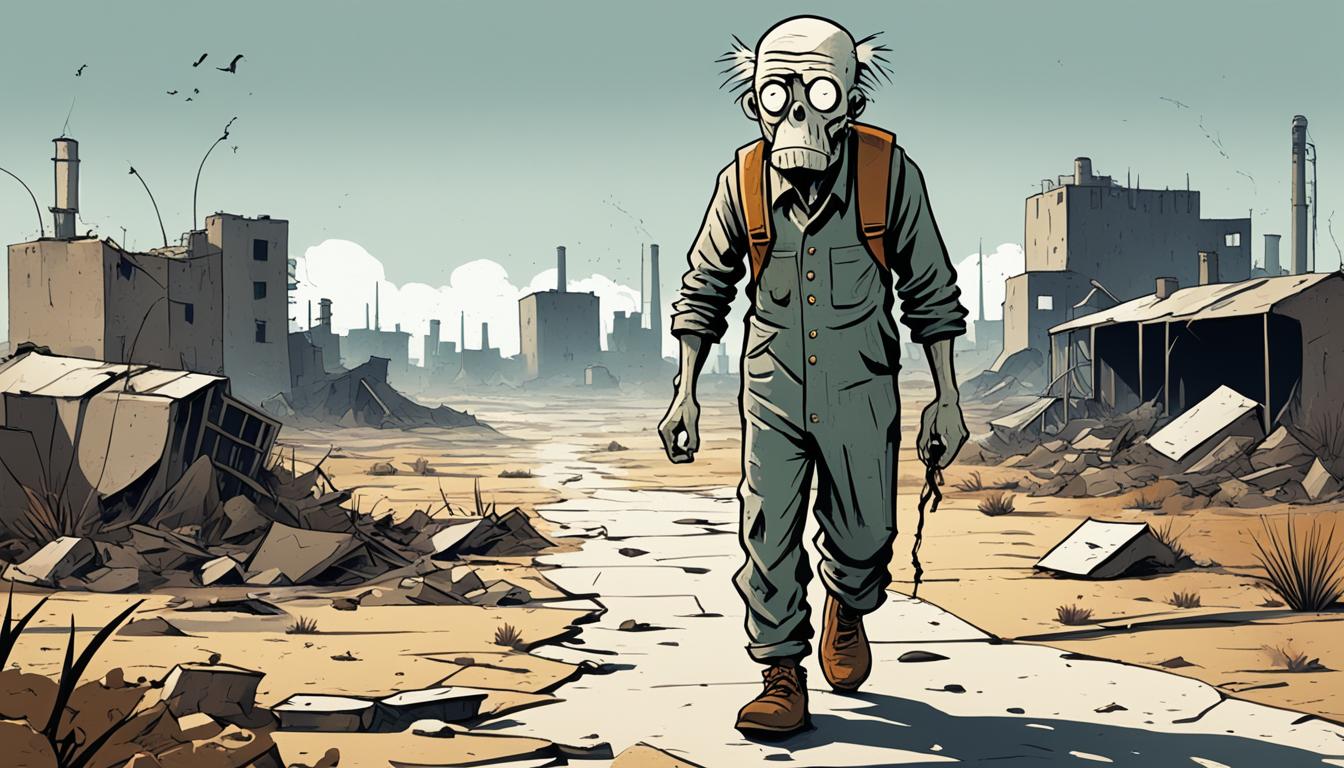In this book summary, we take a closer look at The Corpse Walker, a poignant collection of real-life stories by Liao Yiwu, a Chinese writer and poet. This eye-opening anthology provides an honest and thought-provoking glimpse into the lives of individuals from the fringes of society in China. Through their experiences, we gain insight into the complexities and challenges facing those who often go unheard.
Key Takeaways:
- The Corpse Walker is a collection of real-life stories that explores the lives of individuals from the fringes of society in China.
- Liao Yiwu’s work challenges conventional narratives and highlights the resilience and spirit of those often overlooked.
- The book provides an intimate glimpse into the complexities and challenges facing contemporary China.
- The Corpse Walker raises awareness about social injustice and inequality in Chinese society.
- The book’s powerful storytelling serves as a catalyst for thought and reflection.
Introduction to The Corpse Walker
If you want to learn about the struggles and triumphs of individuals often overlooked by society, Liao Yiwu’s The Corpse Walker is the book for you. This collection of real-life stories provides a rare glimpse into the lives of those residing at the margins of Chinese society, from the poor and destitute to persecuted artists and intellectuals.
With an empathetic eye and a masterful storytelling ability, Liao Yiwu captures the essence of the human experience in these captivating narratives. The Corpse Walker offers a unique perspective on the complexities of contemporary China and challenges readers to explore the hidden corners of society.
| Author: | Liao Yiwu |
|---|---|
| Genre: | Non-fiction |
| Publication date: | 2002 |
| Pages: | 352 |
Discover the motivations behind Liao Yiwu’s quest to share these eye-opening accounts. Gain a deeper understanding of the book’s themes of survival, courage and social justice. Embark on a journey through the pages of one of the most moving and insightful books on contemporary Chinese society.
Life on the Fringe: Exploring Chinese Society
As we dive into the captivating anthology, The Corpse Walker, written by Liao Yiwu, we encounter a poignant portrayal of individuals from the fringes of Chinese society. These individuals face unique challenges, struggling to cope with poverty, discrimination and social exclusion.
Through their personal stories, The Corpse Walker highlights the broader socio-economic and political issues that confront China today. The book provides a platform for marginalized voices to be heard and valued.
In particular, Yiwu’s work reveals the striking realities of life on the fringe, meaningfully representing the diverse experiences of Chinese society. From the underground Christians to the persecuted homosexuals, the Wuhan beggars to the tooth-pullers of Chengdu, each narrative speaks to a wider audience, raising awareness and challenging societal norms.
“Life on the fringe of Chinese society is tough, every day is a battle.”
These narratives not only expose the injustices and inequalities prevalent in today’s China, but also provoke readers to reflect on their own lives and circumstances.
In essence, The Corpse Walker is a compelling indictment of the dominant ideologies that inform and legitimize economic and political policies in China. Through Yiwu’s powerful storytelling, we are reminded of the importance of critically examining the structures that govern society and changing them for the better.
Life on the Fringe: A Comparative Table
Following is a table comparing the unique characteristics of different fringe communities in China, as portrayed in The Corpse Walker.
| Fringe Community | Unique Characteristics |
|---|---|
| Underground Christians | Persecuted for their faith, holding secret services, facing severe punishment if discovered by the authorities. |
| Persecuted Homosexuals | Discriminated against, forced into heterosexual marriages, deprived of basic rights, struggling to carve out their identities in a conservative society. |
| Wuhan Beggars | Living in extreme poverty, suffering from various illnesses, facing social stigma and violence from both the authorities and the general public. |
| Tooth-pullers of Chengdu | Operating in the margins of society, providing dental care to poor patients, facing harassment from the authorities due to unlicensed practice. |
This table showcases the diversity of individuals on the fringe of Chinese society, and reveals the unique challenges faced by each community.
The Corpse Walker: An Insightful Overview
If you are looking for a book that offers a poignant glimpse into the depths of Chinese society, then The Corpse Walker by Liao Yiwu is the perfect read for you. This anthology of real-life stories captures the daily lives and struggles of people living on the fringes of society, shining a light on their unique experiences and bringing their voices to the forefront.
The Corpse Walker is divided into seven sections that cover a diverse range of experiences and perspectives, including stories about people working in the funeral industry, political dissidents, and survivors of the Cultural Revolution. Through these stories, readers gain a deeper understanding of contemporary China and the challenges faced by its citizens.
The book has received widespread acclaim for its honest portrayal of Chinese society and the resilience of its people. It has been translated into multiple languages and has won numerous awards, including the prestigious 2011 German Book Prize.
Through Yiwu’s powerful storytelling and his unflinching look at the realities of Chinese society, The Corpse Walker serves as a powerful reminder of the impact of individuals and the importance of their voices in shaping the world around them.
Courage and Resilience: Highlighting Individual Stories
The Corpse Walker offers a captivating insight into the extraordinary courage and resilience of individuals from the fringes of Chinese society. One such individual is Yang Zhong, a mortician who became known as the ‘corpse walker.’ Despite the overwhelming stigma surrounding death, Yang Zhong remained committed to his job, showing remarkable compassion and respect for the deceased.

Another inspiring story is that of Li Baiguang, a human rights lawyer who fought tirelessly for the rights of marginalized communities. Despite facing immense opposition from authorities and risking his safety, Li Baiguang remained steadfast in his pursuit of justice.
These individual stories not only showcase the tenacity and perseverance of the human spirit but also challenge societal norms and inspire others to strive for a better world.
Exposing Social Injustice: Themes in The Corpse Walker
In The Corpse Walker, Liao Yiwu exposes a harsh reality of social injustice and inequality pervasive in China. By sharing the stories of individuals on the fringes of society, the book sheds light on the struggles faced by those often overlooked and highlights the flawed socio-economic and political systems that have failed them.
The themes of social injustice and inequality in The Corpse Walker are apparent throughout the book, clearly demonstrating the issues that plague Chinese society. The stories reveal a society where power and privilege are concentrated in the hands of a select few, with the vulnerable masses left to suffer. However, while the book paints a bleak picture, it also reveals the strength and resilience of those who have faced life’s greatest injustices.
Through the book’s themes, Liao Yiwu prompts readers to reflect on the broader implications for Chinese society. These issues are not unique to the characters in The Corpse Walker, but rather affect millions of people in China. As one of the most populous nations in the world, China’s social injustices have far-reaching impacts that cannot be ignored.
“A society that dares to strip its people of their dignity will also be stripped of its own.”
The Corpse Walker stands as a call to action, urging readers to confront the uncomfortable realities of life on the fringes of society. This is a book that demands attention, forcing readers to confront the often uncomfortable truths about inequality and social injustice. Only by acknowledging these issues can we work towards a more just and equitable future.
Writing Style and Narrative Techniques in The Corpse Walker
Liao Yiwu’s writing style in The Corpse Walker is both poignant and evocative, conveying the struggles and triumphs of his characters with remarkable clarity. His use of vivid language and sensory detail transport the reader deep into the heart of Chinese society, immersing them in the daily lives of individuals often overlooked by mainstream narratives.
The narrative techniques in The Corpse Walker are similarly impressive, seamlessly weaving together a collection of disparate stories into a cohesive whole. Yiwu’s writing is at once empathetic and nuanced, offering a nuanced exploration of the complex socio-economic and political issues affecting Chinese society.
Through his use of a non-linear structure and interwoven storylines, Yiwu creates a captivating tapestry of human experiences that highlights the resilience and dignity of those living on the fringes of society. The result is a book that is both informative and deeply moving, providing readers with a rare glimpse into the complexities of contemporary China.
Impact and Reception of The Corpse Walker
Since its publication in 2001, The Corpse Walker has had a lasting impact on readers around the world. Liao Yiwu’s candid portrayal of Chinese society has sparked conversations and debates on issues related to power, inequality, and human dignity.
The book has received critical acclaim from various literary circles, including the New York Times Book Review, which described it as “a powerful and unvarnished portrait of what life is like for China’s have-nots.” It also won the prestigious German Book Award in 2011, cementing its status as a vital work of contemporary Chinese literature.
The Corpse Walker has been widely translated into several languages, further expanding its reach and cultural impact. Its reception in China, however, has been more complicated, due to censorship and government restrictions on the publication and distribution of sensitive material.
Despite these challenges, The Corpse Walker has continued to be a thought-provoking and influential work of non-fiction. Its contribution to the literary world and its impact on readers worldwide ensure that it remains a significant book of our times.
Conclusion
The Corpse Walker is a thought-provoking and poignant anthology that provides readers with an intimate glimpse into the lives of those on the fringes of Chinese society. Through Liao Yiwu’s masterful storytelling, the obstacles and challenges faced by these individuals are brought to light, exposing the social injustices and inequalities of contemporary China. The powerful narratives of courage and resilience featured in The Corpse Walker challenge readers to reflect on their own values and beliefs and encourage a deeper understanding of Chinese society.
The impact and reception of The Corpse Walker have extended far beyond literary circles, with its thought-provoking insights and honest portrayal of Chinese society sparking important conversations about the socio-economic and political issues facing the country. As such, it is no surprise that this book has received critical acclaim and appreciation from readers worldwide.
Overall, The Corpse Walker is a powerful work that provides a unique perspective on contemporary China and the individuals who call it home. It serves as a reminder that every person’s story deserves to be heard and that by listening, we can gain a deeper understanding and appreciation of the world around us.



